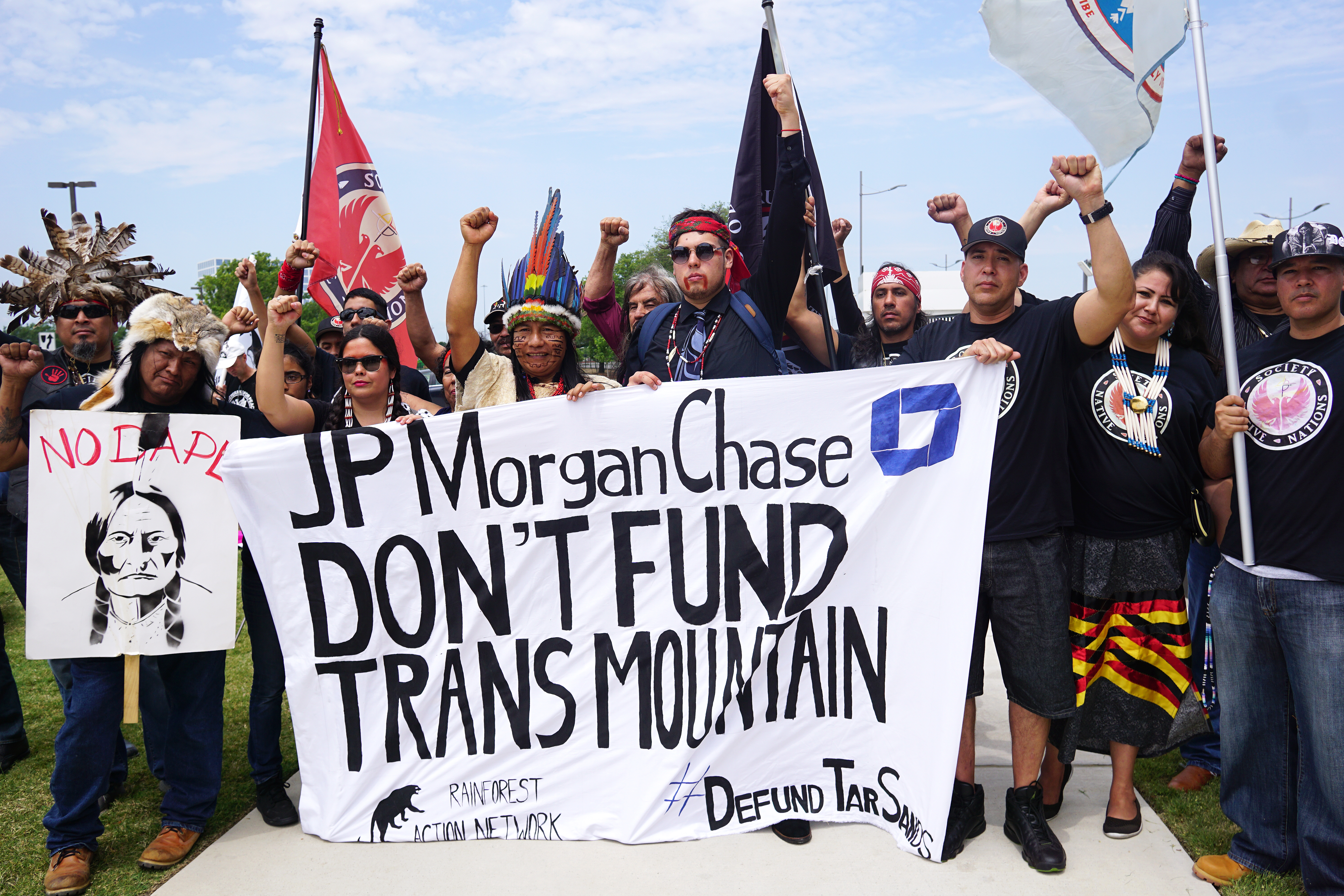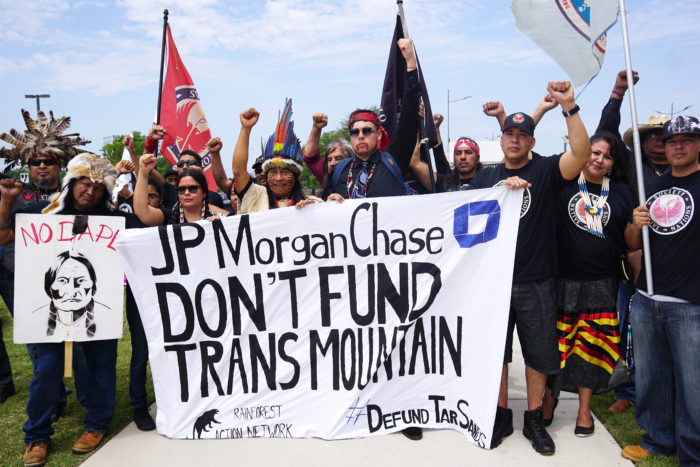This case study was written by Tara Houska (Honor the Earth) and Jason Disterhoft (RAN) for our latest bank report card, Banking on Climate Change: Fossil Fuel Finance Report Card 2019.
Pipeline Victories in 2018
In 2018, Indigenous-led opposition to each of the three major proposed tar sands oil pipelines in North America continued to spotlight the outcomes of failing to secure free, prior and informed consent, alongside the pipelines’ threats to the climate and broader environment. The Trans Mountain pipeline saw the most spectacular setbacks, with Canada’s Federal Court of Appeal quashing the project’s approvals and permits, ruling that both the federal government’s consultation with First Nations communities and its environmental assessments were inadequate.1As former sponsor Kinder Morgan exited the project, Ottawa finalized its extraordinary purchase of the pipeline for C$4.5 billion.2
In August, a federal judge ordered the U.S. State Department to conduct a new environmental review of the route for TransCanada’s Keystone XL (KXL) pipeline, in response to a lawsuit by the Indigenous Environmental Network and allies. The same judge later blocked KXL’s construction pending that reassessment — even as TransCanada was shipping pipe to the route in Montana. 3
2019 will be another year that Enbridge’s Line 3 pipeline isn’t complete — it was originally projected to be in service in 2017.4 The project received its certificate of need and route approval from the Minnesota Public Utilities Commission in June 2018.5 However, the resistance in Minnesota is fierce, resulting in the political players in the administration of Minnesota taking legal action against the state: the state’s Department of Commerce has appealed the decision by the Public Utility Commission to approve Line 3.6 In other words, the state is suing itself.
In March of 2019, Enbridge announced it will delay its in-service projection to late 2020, due to an extended review period of water crossing permits by the state of Minnesota. 7 Three tribes along the proposed route remain explicitly opposed, as do a myriad of non-profit organizations, youth climate intervenors, landowners, and concerned citizens who are engaged in filing numerous lawsuits on the adequacy of the environmental impact statement, the route selected, and other matters.8
In the absence of project-level finance for either Line 3 or KXL, banks like JPMorgan Chase and Bank of Montreal that back Enbridge and/or TransCanada — see the following chart for a fuller list — risk contributing to clear abuse of free, prior and informed consent if these projects proceed. And Canada’s purchase of Trans Mountain does not absolve banks that provided the initial project finance of the Indigenous rights abuses and climate destruction they endorsed.9
Extraction: A Mixed Picture
2018 showed that stopping the expansion of tar sands infrastructure stops the expansion of extraction. The exodus from the tar sands of the supermajor oil and gas companies continued, with Total selling its Joslyn extraction project to Canadian Natural Resources for C$225 million.10 The Alberta government moved to create new rail and refining capacity to move tar sands oil out of Alberta and ease the strain of the pipeline bottleneck.11 In December, Alberta Premier Rachel Notley announced mandatory temporary tar sands production cuts, citing insufficient transportation capacity.12
Significant resistance to new infrastructure projects, particularly by tribal nations, has resulted in a provincial government reducing its tar sands production. 13
These economic lessons about lack of consent by tribal nations should not be taken lightly.
Alarmingly, two extraction companies — backed by banks like JPMorgan Chase and Bank of America — bucked the trend by doubling down. Imperial Oil made a final investment decision to move forward with its Aspen project, the first new tar sands project sanctioned since 2013.14 In March 2019 it delayed this project due to “the uncertainty in the current business environment,” given pipeline constraints and production caps.15 Meanwhile, Teck Resources continued to push its huge Frontier mine: a project that is widely seen as economically unviable.16At C$20.6 billion it would be the most expensive mine in the sector’s history, and with a projected lifespan of 41 years it would last well beyond when world emissions must reach net zero.17
Looking Ahead
Another year of pipeline delays and setbacks will further lock in constraints on tar sands extraction. Industry was counting on Line 3, in particular, to be in service by the end of 2019, when Alberta’s production cuts were scheduled to be lifted. Enbridge’s recent in-service date postponement was a major financial blow to the tar sands, and yet another example of the outcomes of failing to secure free, prior, and informed consent. If Line 3 moves forward, any bank backing Enbridge is supporting abuse of Indigenous rights, threatening the Great Lakes and numerous wetlands, rivers, and watersheds along the pipeline, while putting 1.5°C further out of reach as an achievable goal. 18 Global banks should recognize that risk, and, if Enbridge won’t drop Line 3, the banks should drop Enbridge. If banks do not follow human rights laws and climate science, the Indigenous-led, grassroots opposition will hold them accountable, as it has in other failed North American infrastructure projects.
Who’s Banking Expansion in the Tar Sands?
These are the leading bankers since the Paris Agreement was signed of at least three of the four key companies expanding tar sands production.19
(majority owner of Imperial Oil) |
||||
| JPMorgan Chase | X | X | X | X |
| Bank of America | X | X | X | |
| Bank of Montreal | X | X | ||
| Barclays | X | X | X | |
| CIBC | X | X | X | |
| Citi | X | X | X | |
| Deutsche Bank | X | X | X | |
| RBC | X | X | X | |
| TD | X | X | X |
- Mike De Souza and Carl Meyer, “Court Quashes Trudeau’s Approval of Trans Mountain Pipeline,” National Observer, 30 August 2018.
- Steven Chase, Kelly Cryderman, and Jeff Lewis, “Trudeau Government to Buy Kinder Morgan’s Trans Mountain for $4.5-billion,” The Globe and Mail, 29 May 2018.
- Karl Puckett, “Judge Blocks Construction of Keystone XL Pipeline,” Great Falls Tribune, 11 November 2018.
- Dan Kraker, “Enbridge Eyes Third Oil Pipeline Project Through Northern Minnesota,” MPR News, 5 March 2014.
- Dan Kraker, “Line 3 Oil Pipeline Moves Closer to Construction in Northern Minnesota,” MPR News, 19 November 2018.
- Walker Orenstein, “Walz Administration to Continue Legal Challenge to Enbridge’s Line 3 Pipeline Project,” MinnPost, 12 February 2019.
- Dana Ferguson, “Walz Calls Enbridge Timeline ‘Optimistic’ After Line 3 Project Delay,” Duluth News Tribune, 4 March 2019.
- Red Lake Band of Chippewa Indians, White Earth Band of Ojibwe, Honor the Earth, and The Sierra Club, “In the Matter of the Application of Enbridge Energy, Limited Partnership, for a Certificate of Need for the Line 3 Replacement Project in Minnesota From the North Dakota Border to the Wisconsin Border, OAH 65-2500-32764, MPUC PL9/CN-14-916,” 19 December 2018, p. 21 (of the PDF, labeled p. 12); Various organizations, “Line 3 Letter,” Honor the Earth et al., 2 September 2017.
- Ruth Breech, “Doing “Whatever it Takes” to Stop the Trans Mountain Pipeline,” Rainforest Action Network, 18 August 2017.
- Robert Perkins, “Total Agrees Sale of Joslyn Oil Sands Project to Canadian Natural Resources for C$225 Million,” S&P Global Platts, 31 August 2018.
- David Ljunggren, “Canada’s Alberta Province to Buy Rail Cars to Reduce Oil Glut,” Reuters, 28 November 2018; Kyle Bakx and Tony Seskus, “Why Rachel Notley’s Refinery Pitch Won’t Solve the Oilpatch’s Problem,” CBC, 12 December 2018.
- Michelle Bellefontaine, “Alberta Premier Announces 8.7% Oil Production Cut to Increase Prices,” CBC, 2 December 2018.
- Stewart Phillip and Serge ‘Otsi’ Simon, “Alberta Tarsands Production Cuts Here to Stay: Indigenous-led Movement Will Make Sure of It,” The StarCoast Protectors, 127 September 2018.
- Julie Gordon, “Imperial Oil to Build New Canada Oil Sand Project,” Reuters, 6 November 2018.
- Kevin Orland, “Exxon Delays $1.9 Billion Project in Canada Amid Oil-Sands Woes,” Bloomberg, 15 March 2019.
- Teck is pushing ahead with a project that doesn’t make economic sense. Rystad, the industry database used in this report to tally tar sands reserves, doesn’t even count Teck’s Frontier reserves, because the economic calculations deem the project to be commercially unviable. Source: Rystad Energy AS, Ucube database, accessed November 2018.
- Dan Healing, “Teck Resources Takes $20.6B Frontier Oilsands Mine Project to Joint Hearing,” Financial Post, 25 September 2018.
- “Enbridge Line 3,” US Army Corps of Engineers St. Paul District, updated January 2019.
- Bloomberg Finance L.P. and the data researched for this report, January 2019. This subset of the tar sands financing data aggregates bank financing for these four companies, adjusted down by the proportion of tar sands in the activities of each company named on a given transaction.

